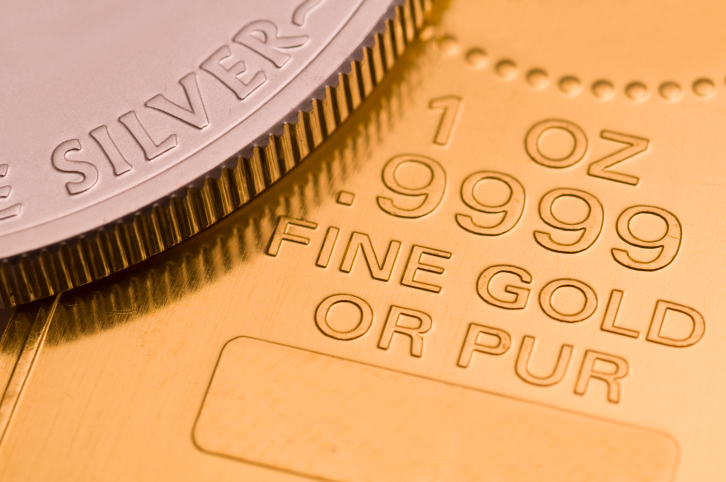Commodities & Metals
2013 Outlook for Gold and Silver: Risk in Gold, the Devil's Metal Shines
Published:
Last Updated:

Silver, which currently trades around $34 an ounce, could rise by nearly 40% in 2013 according to some estimates. One estimate has the price rising to $54 an ounce next year. Bloomberg records a median estimate of $40.25 an ounce for 2013.
The other precious metals — platinum group metals (PGMs) platinum and palladium, among others — are also expected to rise, from current palladium levels of around $680 an ounce to $736, according to Barclays, and $750, according to HSBC. Current platinum prices of around $1,550 an ounce are expected to rise to $1,710 next year, according to HSBC.
Here at 24/7 Wall Street, we looked at some of the drivers behind these price estimates and what 2013 might hold for stocks related to precious metals.
The demand for gold is down to two big drivers going into 2013: emerging market central banks and exchange-traded products backed by physical gold. Central banks, especially from emerging market nations, have been acquiring gold as a means of diversifying their reserve holdings. The yellow metal functions as an insurance policy against the day they will be forced to fire up the printing presses (this could be said of virtually all central banks). Demand from central banks is expected to top 500 tons in 2013, up from an estimated 465 tons this year.
Retail investors in gold either view the yellow metal as a hedge against inflation, a safe haven if the whole world goes crazy, or as just another asset class in which to invest. These investors can choose between ETFs backed by physical gold or gold-mining stocks that are substantially exposed to gold prices.
Funds backed by physical piles of gold run a close second to central banks when it comes to gold demand. The SPDR Gold Shares Trust (NYSEMKT: GLD) and the iShares Gold Trust (NYSEMKT: IAU) both offer shares backed by physical gold and both have demonstrated lacklustre performance this year, with GLD up 1.3% and IAU down more than 6%. The news report of U.S. third-quarter GDP growth rising to 3.1% punished the gold funds yesterday. All gold ETFs worldwide currently hold a record total of 2,630 tons of the yellow metal. The iShares Silver Trust (NYSEMKT: SLV), backed by physical silver, held nearly 19,000 tons at the end of November.
The precious metals sector that looks to be in for the worst time in 2013 is mining. Rising costs, labor unrest and deteriorating ore concentrations made profits hard to come by in 2012 and may get worse next year. Gold miners Barrick Gold Corp. (NYSE: ABX), Goldcorp Inc. (NYSE: GG), Kinross Gold Corp. (NYSE: KCG) and Newmont Mining Co. (NYSE: NEM) are down 27%, 20%, 19% and 28%, respectively, since the beginning of 2012. Only Yamana Gold Inc. (NYSE: AUY) is showing a gain, up nearly 12%. Costs will continue their inexorable rise as ore quality declines causing production to slow. Labor troubles only contribute more to the unsavory equation.
Silver miners Coeur d’Alene Mines Corp. (NYSE: CDE) and Silver Wheaton Inc. (NYSE: SLW) are down 5.5% and up 18.5%, respectively, so far this year. Silver is far more widely used as an industrial metal than is gold, but if the global economy slows down next year, industrial demand for the devil’s metal likely will fall. Investors are expected to purchase 300 tons of silver in 2013, but the physical surplus is not expected to be soaked up by industrial users even if the economy is robust. That means silver prices could experience only a very modest gain next year.
The mining ETFs also have been pummeled this year. The Market Vectors Gold Miners ETF (NYSEMKT: GDX) is down 13.5% so far and the Market Vectors Junior Gold Miners ETF (NYSEMKT: GDXJ) is down more than 18.5%. The Global X Silver Miners ETF is up 4.9% for the year, largely on the strength of Silver Wheaton and Mexico’s two silver mining giants, Fresnillo PLC and Industrias Peñoles. Another large holding, Pan American Silver Corp. (NASDAQ: PAAS), is down more than 19% for the year so far.
So, there are some outside observations as well. Bank of America sees $2,000 gold in 2013. Jefferies came up with a way to pair gold against the gold miners in 2013. Also, here is a list of the central banks that are still buying up gold.
For 2013, mining stocks appear to carry the biggest risk. Physical gold is at risk either as an asset class if the U.S. should tumble off the fiscal cliff or as a safe haven if the cliff is somehow avoided. Silver faces the same risks as gold, but to a lesser degree, owing to its industrial uses. Investors looking for hard assets might want to look hard at silver and then decide if they can live with the volatility of the devil’s metal.
Take a look at other sector outlook pieces from 24/7 Wall St. for 2013:
Paul Ausick
If you’re one of the over 4 Million Americans set to retire this year, you may want to pay attention.
Finding a financial advisor who puts your interest first can be the difference between a rich retirement and barely getting by, and today it’s easier than ever. SmartAsset’s free tool matches you with up to three fiduciary financial advisors that serve your area in minutes. Each advisor has been carefully vetted, and must act in your best interests. Start your search now.
Don’t waste another minute; get started right here and help your retirement dreams become a retirement reality.
Thank you for reading! Have some feedback for us?
Contact the 24/7 Wall St. editorial team.